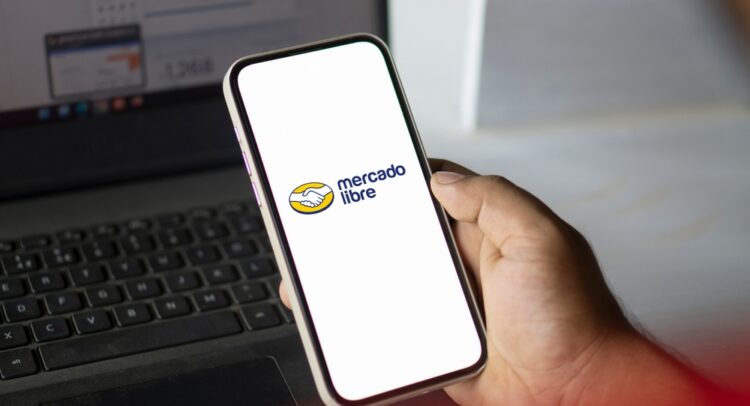MercadoLibre (MELI) is arguably one of the strongest long-term investments currently on the stock market. My valuation model posits that the Latin American e-commerce company has a 30% margin of safety in its current stock price that could compound at an annual growth rate of 18% over the next 10 years. Although there are risks, including competition from other major players in Latin America, MercadoLibre’s robust management team should enable it to overcome these obstacles.
Elevate Your Investing Strategy:
- Take advantage of TipRanks Premium at 50% off! Unlock powerful investing tools, advanced data, and expert analyst insights to help you invest with confidence.
MELI Capitalizes on Growth Opportunities in Latin America
I’m particularly bullish on MercadoLibre because of macroeconomic trends. Latin America is the fastest-growing e-commerce market globally, with retail sales projected to double between 2021 and 2027, supported by increasing internet penetration, mobile adoption, and a shift toward digital payments.
Additionally, over half of the region’s population remains unbanked or underbanked, creating massive opportunities for MercadoPago, MELI’s fintech arm. MercadoPago already accounts for over 40% of MELI’s revenue. Given these modernization trends in Latin America, MercadoLibre is well-positioned to capitalize on this significant market potential.
Driving Growth Across Key Segments
Building on this momentum, in Q3 2024, the company’s e-commerce revenues grew by 48% year-over-year, reaching $3.1 billion, making it MercadoLibre’s largest revenue generator. To support this growth, management invested in five new fulfillment centers in Brazil and one in Mexico to enhance delivery speeds, improve buyer satisfaction, and drive higher gross merchandise volume.
MercadoPago is also robust and full of long-term opportunities. In Q3 2024, its revenues reached $2.2 billion. Furthermore, Mercado Ads, the company’s Digital Advertising division, saw revenue grow by 37% year-over-year in Q3 2024. Together, these three segments—E-Commerce, Fintech, and Digital Advertising—comprise the bulk of the company’s operations and valuation.
I remain bullish on MercadoLibre as a long-term investment due to its strong market position and favorable macroeconomic trends. In my view, there are few investments worth holding for many years, and MercadoLibre is certainly one of them.
MercadoLibre Is Reasonably Valued
My current valuation model for MercadoLibre forecasts a revenue compound annual growth rate of just under 15% over the next 10 years, reaching $77 billion in trailing 12-month revenue by January 2035. I also project that the company will achieve a net margin of 17.5% by January 2035, fueled by economies of scale and increased automation. This implies a net income of $13.5 billion.
The share count has been growing at a compound annual rate of 1.38% over the past 10 years. If this continues, MercadoLibre will have 58.55 million trailing 12-month shares outstanding by January 2035, resulting in an earnings-per-share figure of $230.
MercadoLibre’s current price-to-earnings ratio is approximately 60, while the sector median is closer to 20. For conservatism, I use 40 as my terminal multiple, assuming the company’s growth rate slows modestly over time and its net margin expands. This leads to a January 2035 price target of $9,200 per share.
With the current stock price at $1,765, my forecast indicates an 18% compound annual growth rate in the company’s stock price over the next 10 years.
Assessing Intrinsic Value and Margin of Safety
Additionally, MercadoLibre’s weighted average cost of capital (WACC) is 13.74%, with equity accounting for 94.19% and debt for 5.81%. The cost of equity stands at 14.28%, while the after-tax cost of debt is 4.92%. Discounting back the January 2035 price target using this WACC yields a current intrinsic value of $2,539, implying a 30% margin of safety.
MELI Stock Is Not Without Risks
MercadoLibre is not the only major e-commerce company in Latin America. Competition comes from Amazon (AMZN), as well as newer entrants like Shein, Temu (Pinduoduo) (PDD), and Shopee. Amazon, in particular, could intensify its focus on Latin American markets after the AI infrastructure race settles, posing a significant challenge to MercadoLibre.
Because MercadoLibre trades at high valuation multiples, any operational or macroeconomic crises could lead to steep valuation declines, despite the apparent 30% undervaluation over a long time horizon. For this reason, I believe it’s prudent to allocate a moderate 5% to 7.5% of a portfolio to this investment.
Moreover, the company may struggle to expand its net margin—or even maintain its current level—if it must make more extensive logistics investments to remain competitive, faces bad debt provisions in MercadoPago, or is outpriced by Amazon in its core Latin American markets.
What Does Wall Street Say About MercadoLibre?
On Wall Street, MercadoLibre has a consensus Strong Buy rating based on 10 Buys, one Hold, and zero Sells. The average MELI price target is $2,340.91, indicating a potential 27.63% upside over the next 12 months. This reinforces my bullish view and suggests that MercadoLibre’s returns could accelerate sooner rather than later.

Conclusion
When looking for long-term investments, I follow Warren Buffett’s advice to carefully choose my stocks. Given this, it’s notable that I regard MercadoLibre as an excellent long-term investment at its current valuation. With its robust operations, favorable macroeconomic environment, and an experienced management team, MercadoLibre has rightly earned its consensus Strong Buy rating on Wall Street, in my opinion.
















